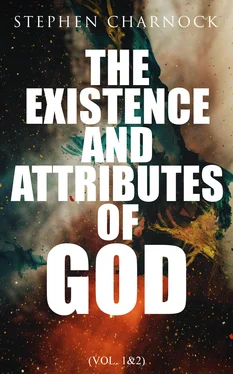Stephen Charnock - The Existence and Attributes of God (Vol. 1&2)
Здесь есть возможность читать онлайн «Stephen Charnock - The Existence and Attributes of God (Vol. 1&2)» — ознакомительный отрывок электронной книги совершенно бесплатно, а после прочтения отрывка купить полную версию. В некоторых случаях можно слушать аудио, скачать через торрент в формате fb2 и присутствует краткое содержание. Жанр: unrecognised, на английском языке. Описание произведения, (предисловие) а так же отзывы посетителей доступны на портале библиотеки ЛибКат.
- Название:The Existence and Attributes of God (Vol. 1&2)
- Автор:
- Жанр:
- Год:неизвестен
- ISBN:нет данных
- Рейтинг книги:3 / 5. Голосов: 1
-
Избранное:Добавить в избранное
- Отзывы:
-
Ваша оценка:
- 60
- 1
- 2
- 3
- 4
- 5
The Existence and Attributes of God (Vol. 1&2): краткое содержание, описание и аннотация
Предлагаем к чтению аннотацию, описание, краткое содержание или предисловие (зависит от того, что написал сам автор книги «The Existence and Attributes of God (Vol. 1&2)»). Если вы не нашли необходимую информацию о книге — напишите в комментариях, мы постараемся отыскать её.
The Existence and Attributes of God (Vol. 1&2) — читать онлайн ознакомительный отрывок
Ниже представлен текст книги, разбитый по страницам. Система сохранения места последней прочитанной страницы, позволяет с удобством читать онлайн бесплатно книгу «The Existence and Attributes of God (Vol. 1&2)», без необходимости каждый раз заново искать на чём Вы остановились. Поставьте закладку, и сможете в любой момент перейти на страницу, на которой закончили чтение.
Интервал:
Закладка:
2. Man would be his own end. This is natural and universal. This is seen in frequent self‑applauses and inward overweening reflections; in ascribing the glory of what we do or have to ourselves; in desire of self‑pleasing doctrines; in being highly concerned in injuries done to ourselves, and little or not at all concerned for injuries done to God; in trusting in ourselves; in workings for carnal self against the light of our own consciences: this is a usurping God’s prerogative, vilifying God, destroying God. Man would make anything his end or happiness rather than God. This appears in the fewer thoughts we have of him than of anything else; in the greedy pursuit of the world; in the strong addictedness to sensual pleasures; in paying a service, upon any success in the world, to instruments more than to God: this is a debasing God in setting up a creature, but more in setting up a base lust; it is a denying of God. Man would make himself the end of all creatures. In pride; using the creatures contrary to the end God hath appointed: this is to dishonor God, and it is diabolical. Man would make himself the end of God; in loving God, because of some self‑pleasing benefits distributed by him; in abstinence from some sins, because they are against the interest of some other beloved corruption; in performing duties merely for a selfish interest, which is evident in unwieldiness in religious duties, where self is not concerned; in calling upon God only in a time of necessity; in begging his assistance to our own projects after we have by our own craft, laid the plot; in impatience upon a refusal of our desires; in selfish aims we have in our duties: this is a vilifying God, a dethroning him; in unworthy imaginations of God, universal in man by nature. Hence spring idolatry, superstition, presumption, the common disease of the world. This is a vilifying God; worse than idolatry, worse than absolute atheism. Natural desires to be distant from him; no desires for the remembrance of him; no desires of converse with him; no desires of a thorough return to him; no desire of any close imitation of him.
DISCOURSE III.
ON GOD’S BEING A SPIRIT.
Table of Contents
John iv. 24—God is a Spirit: and they that worship him must worship him in spirit and in truth.
The words are part of the dialogue between our Saviour and the Samaritan woman. 312Christ, intending to return from Judea to Galilee, passed through the country of Samaria, a place inhabited not by Jews, but a mixed company of several nations, and some remainders of the posterity of Israel, who escaped the captivity, and were returned from Assyria; and being weary with his journey, arrived about the sixth hour or noon (according to the Jews’ reckoning the time of the day), at a well that Jacob had digged, which was of great account among the inhabitants for the antiquity of it, as well as the usefulness of it, in supplying their necessities: he being thirsty, and having none to furnish him wherewith to draw water, at last comes a woman from the city, whom he desires to give him some water to drink. The woman, perceiving him by his language or habit to be a Jew, wonders at the question, since the hatred the Jews bore the Samaritans was so great, that they would not vouchsafe to have any commerce with them, not only in religious, but civil affairs, and common offices belonging to mankind. Hence our Saviour takes occasion to publish to her the doctrine of the gospel; and excuseth her rude answer by her ignorance of him; and tells her, that if she had asked him a greater matter, even that which concerned her eternal salvation, he would readily have granted it, notwithstanding the rooted hatred between the Jews and Samaritans; and bestowed a water of a greater virtue, the “water of life.” 313The woman is no less astonished at his reply than she was at his first demand. It was strange to hear a man speak of giving living water to one of whom he had begged the water of that spring, and had no vessel to draw any to quench his own thirst. She therefore demands whence he could have this water that he speaks of, 314since she conceived him not greater than Jacob, who had digged that well and drank of it. Our Saviour, desirous to make a progress in that work he had begun, extols the water he spake of, above this of the well, from its particular virtue fully to refresh those that drank of it, and be as a cooling and comforting fountain within them, of more efficacy than that without. 315The woman, conceiving a good opinion of our Saviour, desires to partake of this water, to save her pains in coming daily to the well, not apprehending the spirituality of Christ’s discourse to her: 316Christ finding her to take some pleasure in his discourse, partly to bring her to a sense of her sin, before he did communicate the excellency of his grace, bids her return back to the city and bring her husband with her to him. 317She freely acknowledges that she had no husband; whether having some check of conscience at present for the unclean life she led, or loth to lose so much time in the gaining this water so much desired by her: 318our Saviour takes an occasion from this to lay open her sin before her, and to make her sensible of her own wicked life and the prophetic excellency of himself; and tells her she had had five husbands, to whom she had been false, and by whom she was divorced, and the person she now dwelt with was not her lawful husband, and in living with him she violated the rights of marriage, and increased guilt upon her conscience. 319The woman being affected with this discourse, and knowing him to be a stranger that could not be certified of those things but in an extraordinary way, begins to have a high esteem of him as a prophet. 320And upon this opinion she esteems him able to decide a question, which had been canvassed between them and the Jews, about the place of worship. 321Their fathers worshipping in that mountain, and the Jews affirming Jerusalem to be a place of worship, she pleads the antiquity of the worship in this place, Abraham having built an altar there (Gen. xii. 7), and Jacob, upon his return from Syria. And, surely, had the place been capable of an exception, such persons as they, and so well acquainted with the will of God, would not have pitched upon that place to celebrate their worship. Antiquity hath, too, too often bewitched the minds of men, and drawn them from the revealed will of God. Men are more willing to imitate the outward actions of their famous ancestors, than conform themselves to the revealed will of their Creator. The Samaritans would imitate the patriarchs in the place of worship, but not in the faith of the worshippers. Christ answers her, that this question would quickly be resolved by a new state of the church, which was near at hand; and neither Jerusalem, which had now the precedency, nor that mountain, should be of any more value in that concern, than any other place in the world: 322but yet, to make her sensible of her sin and that of her countrymen, tells her, that their worship in that mountain was not according to the will of God, he having long after the altars built in this place, fixed Jerusalem as the place of sacrifices; besides, they had not the knowledge of that God which ought to be worshipped by them, but the Jews had the “true object of worship,” and the “true manner of worship, according to the declaration God had made of himself to them.” 323But all that service shall vanish, the veil of the temple shall be rent in twain, and that carnal worship give place to one more spiritual; shadows shall fly before substance, and truth advance itself above figures; and the worship of God shall be with the strength of the Spirit: such a worship, and such worshippers doth the Father seek; 324for “God is a Spirit: and those that worship him must worship him in spirit and in truth.” The design of our Saviour is to declare, that God is not taken with external worship invented by men, no, nor commanded by himself; and that upon this reason, because he is a spiritual essence, infinitely above gross and corporeal matter, and is not taken with that pomp which is a pleasure to our earthly imaginations.
Читать дальшеИнтервал:
Закладка:
Похожие книги на «The Existence and Attributes of God (Vol. 1&2)»
Представляем Вашему вниманию похожие книги на «The Existence and Attributes of God (Vol. 1&2)» списком для выбора. Мы отобрали схожую по названию и смыслу литературу в надежде предоставить читателям больше вариантов отыскать новые, интересные, ещё непрочитанные произведения.
Обсуждение, отзывы о книге «The Existence and Attributes of God (Vol. 1&2)» и просто собственные мнения читателей. Оставьте ваши комментарии, напишите, что Вы думаете о произведении, его смысле или главных героях. Укажите что конкретно понравилось, а что нет, и почему Вы так считаете.












